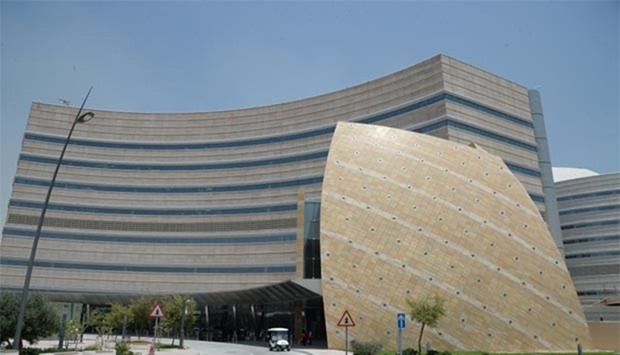Three departments of the Outpatient Clinics at Sidra, namely dermatology, paediatric general surgery consultation and obstetrics diagnostics and obstetrics, will be operational from next Sunday as the state-of-the-art facility begins its phased opening of the clinics and the entire facility. The clinics will run from 7am to 3pm on weekdays.
“As we start operations from next week, we expect about 125 patients per week in the beginning. By November this year, we will have 84 clinics running and expect to see around 5,000 patients a week once they are fully operational by early 2017,” explained Dr David Sigalet, medical director of the Sidra Outpatient Clinic and chief of surgery.

Dr David Sigalet and Khalid al-Mohannadi addressing the media on Wednesday.
He clarified during a media tour and briefing that Sidra outpatient clinic is a referral based facility. It does not accept walk-in patients nor does it offer any emergency services.
The referral to Sidra has to come from the Hamad Medical Corporation (HMC) or the Primary Health Care Corporation (PHCC).
Khalid al-Mohannadi, director of communications, Sidra, said the clinics would provide specialised healthcare to patients after they had been referred by their primary or secondary healthcare practitioner.
"Patients will be seen based on the severity of their condition," said al-Mohannadi.
"At present, Sidra will not be accepting referral patients from private healthcare institutions. However, plans are underway to widen the referral network so that we can accept referrals from physicians from other healthcare institutions,” he added.
“The Sidra Outpatient Clinics will be offering outpatient care based on diagnoses, observation, consultation and treatment. These services do not require an overnight hospital stay. Services at the clinics will include dermatology, paediatric general surgery consultation, obstetrics, radiology, pathology, pharmacy and laboratory services.”
Sidra officials pointed out that the clinical services provided at Sidra would be chargeable and people could pay either by using HMC Health Card, or through approved private insurances or by cash as well as through debit and credit cards.
As for an appointment at a Sidra clinic, the patient’s existing healthcare provider will co-ordinate to schedule and confirm a consultation with a Sidra physician, when a referral has been made. For pregnant women, if it has been determined that their antenatal care will be at Sidra; there will be co-ordination between HMC and Sidra to schedule their appointments.
However, Sidra will not be offering any emergency services at the outpatient clinics. Sidra has advised adult patients that they should visit HMC Emergency Department for any medical emergency. Similarly children may be taken to HMC’s Paediatric Emergency Centres.
Pregnant patients who are referred to Sidra will have access to routine prenatal care, education and testing. However, there will be no delivery in the Sidra Outpatient Clinic, which also offers several high-tech facilities in a first for the region.
These include palm vein recognition technology, digital signature of the patients, attractive themes on the walls of the scan room for children and a 3D printer to provide 3D models of a patient’s organs among others.

